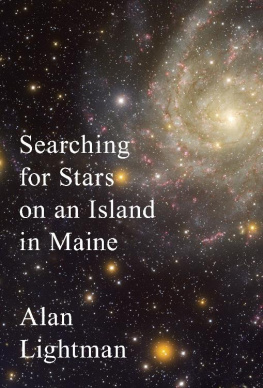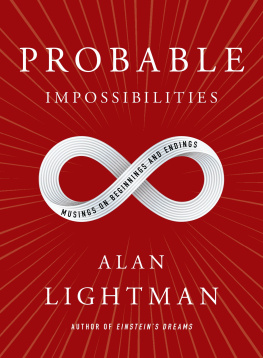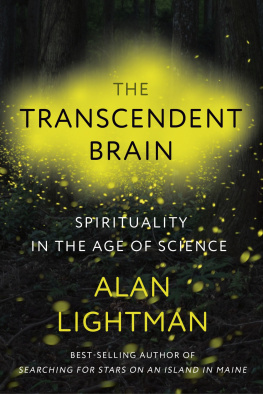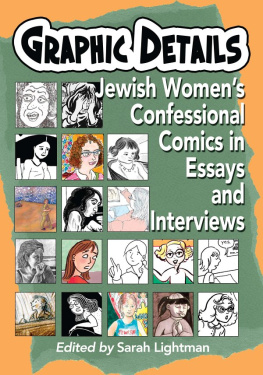Alan Lightman - Mr g: A Novel About the Creation
Here you can read online Alan Lightman - Mr g: A Novel About the Creation full text of the book (entire story) in english for free. Download pdf and epub, get meaning, cover and reviews about this ebook. year: 2012, publisher: Pantheon, genre: Art. Description of the work, (preface) as well as reviews are available. Best literature library LitArk.com created for fans of good reading and offers a wide selection of genres:
Romance novel
Science fiction
Adventure
Detective
Science
History
Home and family
Prose
Art
Politics
Computer
Non-fiction
Religion
Business
Children
Humor
Choose a favorite category and find really read worthwhile books. Enjoy immersion in the world of imagination, feel the emotions of the characters or learn something new for yourself, make an fascinating discovery.

- Book:Mr g: A Novel About the Creation
- Author:
- Publisher:Pantheon
- Genre:
- Year:2012
- Rating:3 / 5
- Favourites:Add to favourites
- Your mark:
- 60
- 1
- 2
- 3
- 4
- 5
Mr g: A Novel About the Creation: summary, description and annotation
We offer to read an annotation, description, summary or preface (depends on what the author of the book "Mr g: A Novel About the Creation" wrote himself). If you haven't found the necessary information about the book — write in the comments, we will try to find it.
Mr g: A Novel About the Creation — read online for free the complete book (whole text) full work
Below is the text of the book, divided by pages. System saving the place of the last page read, allows you to conveniently read the book "Mr g: A Novel About the Creation" online for free, without having to search again every time where you left off. Put a bookmark, and you can go to the page where you finished reading at any time.
Font size:
Interval:
Bookmark:
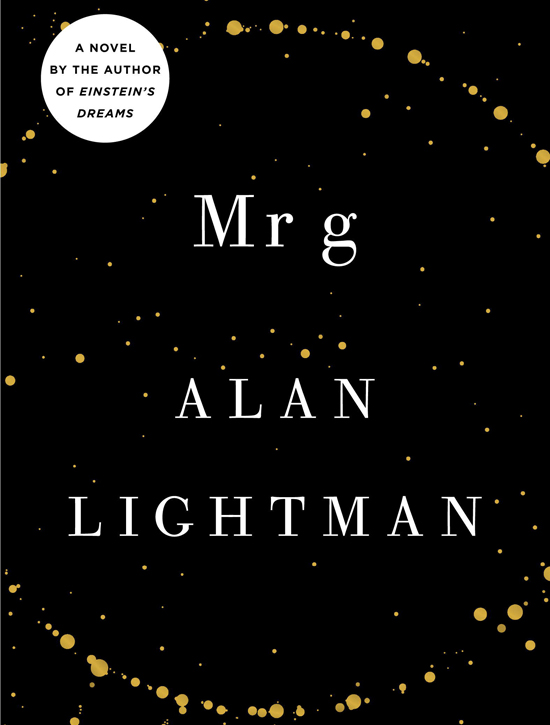
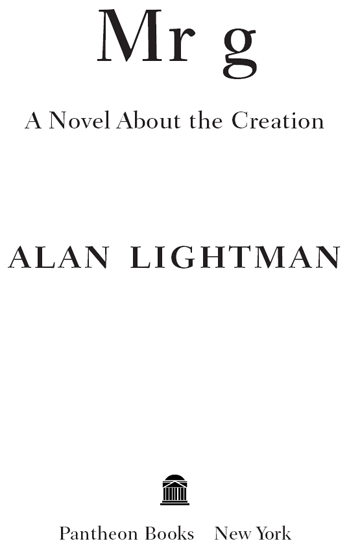
This is a work of fiction. Names, characters, places, and incidents either are the product of the authors imagination or are used fictitiously. Any resemblance to actual persons, living or dead, events, or locales is entirely coincidental.
Copyright 2012 by Alan Lightman
All rights reserved. Published in the United States by Pantheon Books, a division of Random House, Inc., New York, and in Canada by Random House of Canada Limited, Toronto.
Pantheon Books and colophon are registered trademarks of Random House, Inc.
Library of Congress Cataloging-in-Publication Data
Lightman, Alan P., [date]
Mr g: a novel about the creation / Alan Lightman.
p. cm.
eISBN 978-0-307-90704-2
1. GodFiction. 2. CreationFiction. 3. EvolutionFiction. 4. UniverseFiction. I. Title. II. Title: Mister g: a novel about the creation.
PS3562.I45397M7 2011 813'.54dc22 2011000095
www.pantheonbooks.com
Cover design by Rodrigo Corral Design
Book design by Virginia Tan
First Edition
v3.1
This book is dedicated to my brother
Ronnie Lightman
(19512010)
As I remember, I had just woken up from a nap when I decided to create the universe.
Not much was happening at that time. As a matter of fact, time didnt exist. Nor space. When you looked out into the Void, you were really looking at nothing more than your own thought. And if you tried to picture wind or stars or water, you could not give form or texture to your notions.
Those things did not exist. Smooth, rough, waxy, sharp, prickly, brittleeven qualities such as these lacked meaning. Practically everything slept in an infinite torpor of potentiality. I knew that I could make whatever I wanted. But that was the problem. Unlimited possibilities bring unlimited indecision. When I thought about this particular creation or that, uncertain about how each thing would turn out, I grew anxious and went back to sleep. But at a particular moment, I managed if not exactly to sweep aside my doubts, at least to take a chance.
Almost immediately, it seemed, my aunt Penelope asked me why I would want to do such a thing. Wasnt I comfortable with the emptiness just as it was? Yes, yes, I said, of course, but You could mess things up, said my aunt. Leave Him alone, said Uncle Deva. Uncle toddled over and stood beside me in his dear way. Please dont tell me what to do, retorted my aunt. Then she turned and stared hard at me. Her hair, uncombed and knotted as usual, drooped down to her bulky shoulders. Well? she said, and waited. I never liked it when Aunt Penelope glowered at me. I think Im going to do it, I finally said. It was the first decision Id made in eons of unmeasured existence, and it felt good to have decided something. Or rather, to have decided that something had to be done, that a change was in the offing. I had chosen to replace nothingness with something. Something is not nothing. Something could be anything. My imagination reeled. From now on, there would be a future, a present, and a past. A past of nothingness, and then a future of something.
In fact, I had just created time. But unintentionally. It was just that my resolution to act, to make things, to put an end to the unceasing absence of happenings, required time. By deciding to create something, I had pressed an arrow into the shapeless and unending Void, an arrow that pointed in the direction of the future. Henceforth, there would be a before and an after, a continuing stream of successive events, a movement away from the past and towards the futurein other words, a journey through time. Time necessarily came before light and dark, matter and energy, even space. Time was my first creation.
Sometimes, the absence of a thing is not noticed until it is present. With the invention of time, events that had once merged together in one amorphous clot began to take shape. Each event could now be enveloped by a slipcover of time, separating it from all other events. Every motion or thought or the slightest happenstance could be ordered and placed exactly in time. For example, I realized that I had been sleeping for a very long time. And near mebut I couldnt say how near, because I had not yet created spaceAunt Penelope and Uncle Deva had also been sleeping, their loud snores rising and falling like something or other, their tossings and turnings unfolding in time. And their interminable bickering could now be identified with moments of wakefulness, which in turn could be understood as taking place between periods of sleep. I refused to think how much time I had wasted. In fact, we had all slept in a kind of pleasant amnesia, a swoon, an infinite senselessness. In various ways, had we not luxuriated in the unstructured Void, unaccountable for our actions? Yes, unaccountable. Because without time, there could be no reactions to actions, no consequences. Without time, decisions need not be considered for their implications and effects. We had all been drifting in a comfortable Void without responsibilities.
See, my aunt complained when it became apparent that we were now conscious of time. I told you that you would mess things up. She shot Uncle a look of disapproval, as if he had encouraged me to act as I had, and then she began an unhappy summary of the various things that she had done and not done during the immediate past, then during the past before that, and so on, back and back through the now visible chasms of time, until Uncle begged her to stop. You should never have created the past and the future, she said. We were happy here. See, now I must say were, when before Oh! There it is again. It was nicer when everything happened at once. I cant stand to think about the future. But dont you think that we have some responsibility to the future? I suggested. To all the things and beings I might create? Nonsense, shrieked Aunt Penelope. What a foolish argument. You have no responsibility to things that dont yet exist and wont ever exist if you could just keep your big thoughts to yourself. But its too late now, she went on. I can feel time. I can feel the future. She had gotten herself into one of her states, and the Void twisted and throbbed with her displeasure. Gently, Uncle caressed her. For the first time ever, she responded to his touch. Her ranting diminished. Soon after, she realized that her hair needed combing, and that was the beginning of something and probably all for the best.
Time trickled by for certain periods and intervals. At other moments, it gushed ahead, flew headlong into the future, then braked and slowed again to a trickle. Having created time, I had not decided whether it should flow uniformly or in fits and starts. But the matter was more nettlesome than that. Since I had not yet created clocks, one could not say what constituted a smooth versus a choppy passage of time. There was nothing to measure it. Perhaps the movement of time might even be relative to the observer. Or perhaps it could be only perception. At the beginning, all any of us knew for sure was that time flowed. I didnt feel like committing myself right away to one possibility or the otherI had been pondering much as it wasso I decided to decide the texture of time at a future date.
Whether smooth or choppy, the creation of time had already altered the Void. Before time, we did not move through the Void so much as we experienced it all at once. Or rather, the Void clung to our beings, the Void contained our thoughts, the Void constituted the nothingness against which our somethingness existed. After time, the Void remained an infinite and unchanging emptiness, but now one could travel through it as well as think it, one could say that one had been at a particular place of the Void at one moment and another place at a later moment. Not that the Void had signposts or markers to designate definite locationsthe Void was perfectly smooth, empty, and without any shapebut we understood that such locations existed in principle, and we could pass from one to the other over a period of time. And even though the Void was empty, totally empty, at various moments we could glimpse the faintest of featureswispy draperies, veils, gossamer ridges, valleys of nothingnessthat would briefly appear and then disappear. Such elusive structures arose between the seams of the many layers of nothingness packed on top of one another, where they did not fit precisely together. If one began moving towards a particular of these evanescent topographies, it would vanish in short order but nevertheless provide a momentary route of travel, a fleeting destination, a temporary break from the complete formlessness of the Void.
Font size:
Interval:
Bookmark:
Similar books «Mr g: A Novel About the Creation»
Look at similar books to Mr g: A Novel About the Creation. We have selected literature similar in name and meaning in the hope of providing readers with more options to find new, interesting, not yet read works.
Discussion, reviews of the book Mr g: A Novel About the Creation and just readers' own opinions. Leave your comments, write what you think about the work, its meaning or the main characters. Specify what exactly you liked and what you didn't like, and why you think so.

